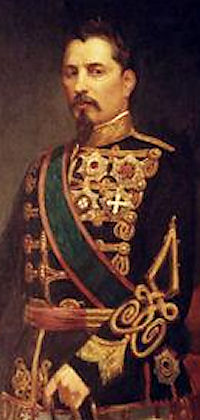Prince Alexander Cuza [1858-1866]
 In 1822 the demand of Roumania for rulers of her own people was at last granted by the Porte ; the Phanariot rule came to an end and the rule of native boyars or Princes began. But the country was in a deplorable state, and but little improvement was made, for the nobles and Princes were constantly intriguing against each other, and any ruler with popular principles was denounced as a traitor to his caste. In 1856, the Treaty of Paris accorded her the restitution of the Delta of the Danube, taken from her by Russia in 1812. France supported Roumania in her great desire to unite the two principalities under one rule. In 1858 the union of the two principalities, the election of a foreign Prince, hereditary succession, and a monarchical government were at last granted. Thus, after six centuries of incredible intrigue and bloodshed, the brave tempest-ridden little country secured her freedom, and Roumania as a nation was born.
In 1822 the demand of Roumania for rulers of her own people was at last granted by the Porte ; the Phanariot rule came to an end and the rule of native boyars or Princes began. But the country was in a deplorable state, and but little improvement was made, for the nobles and Princes were constantly intriguing against each other, and any ruler with popular principles was denounced as a traitor to his caste. In 1856, the Treaty of Paris accorded her the restitution of the Delta of the Danube, taken from her by Russia in 1812. France supported Roumania in her great desire to unite the two principalities under one rule. In 1858 the union of the two principalities, the election of a foreign Prince, hereditary succession, and a monarchical government were at last granted. Thus, after six centuries of incredible intrigue and bloodshed, the brave tempest-ridden little country secured her freedom, and Roumania as a nation was born.
Alexander Cuza, the first Prince elected, had a difficult role to fulfil, having to submit to a double investiture of the two principalities, and the perplexity of maintaining two separate ministries. In 1861, however, this was simplified by the Porte granting the union of the two Assemblies ; and on December 23rd of that year, the Prince in a proclamation to his people was able to announce that "The Roumanian nation is founded."
During the eight years of his reign many reforms were accomplished ; the most noteworthy being the foundation of the two Roumanian Universities, one at Bucharest and one at Jassy ; the severance of the Church from the corrupt Greek Patriarchate ; the sequestration of the monasteries, their lands and treasures; and finally the emancipation of the peasantry, the granting to them of land, and their release from some of the most onerous of their feudal obligations.
His devotion to and too hasty adoption of French ideals and institutions proved premature and unwise in a country not yet prepared for such innovations. He had also the misfortune to arouse the antagonism of the great families by his suspension of the freedom of the Press- then only in the early stages of its existence-and by the excesses of his private life. The general dissatisfaction culminated in February, 1866, when he was forced to abdicate and disappeared from the country.
Notwithstanding the extreme irregularities of his private life and his despotic disregard of constitutional forms, Cuza stands out as a Prince beloved-and even adored by the peasants-whose hard lot he had done so much to ameliorate.
|
NEWSLETTER
|
| Join the GlobalSecurity.org mailing list |
|
|
|

